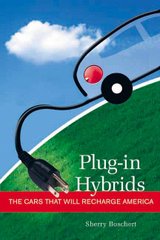It was January 2nd this year when oil hit $100 for the first time. Today it reached $140, and OPEC warns it will only get worse, and soon.
Instead of biting the bullet and facing the need for plug-in cars quick, "solutions" put on the table by the presidential candidates wouldn't have an impact as soon as required to meet carbon and petroleum reduction or national security goals. To say nothing of consumer's need for cheaper transportation fuel. Domestic oil producers apparently aren't extracting domestically where already approved but clamor for access to the coast. Even if Congress authorized coastal and ANWR exploitation as McCain now supports, the impact would be too late and too little. I'm pleased to hear McCain promoting electrics, but his battery contest proposal would at best have a medium term impact.
We need to see policies that will push electric cars and plug-in hybrids with available battery technology. The $9000 incentive California put on the table in the 90s for electric cars wasn't enough to interest automakers. Today, were product available, such an incentive would see consumers lining up for cars they once might have snubbed as range-deficient and over-priced.
Thursday, June 26, 2008
Friday, June 13, 2008
Overflow crowd at DC plug-in conference
News of oil by the barrel and gas by the gallon reaching new highs had been dominating TV and print, so it was perhaps not surprising that the Google/Brookings Plug-in Electric Vehicle Conference saw overflow crowds. The speeches and hallway chatter suggested plug-in vehicles have finally caught the attention of industry bigwigs and policy makers. Auto makers, electric utilities, battery makers and advocates all found themselves under one roof in the nation’s capital, and all said regarding plug-in vehicles it is a matter of “when” not “if.”
Many of the speeches sounded notes long trumpeted by advocates at Plug In America and the Electric Auto Association. The benefits to the environment were repeatedly mentioned, and the national security rationale for plug-ins was brought to the fore. The state of the grid was discussed by advocates and utility executives. Some concern was voiced about the day tens of millions of cars charge up from and contribute to the grid. Yet there was near unanimity that the utility infrastructure can handle the plug-in cars being introduced in the near term.
Politicians from both parties, both long-term advocates of alternative fuels and long-term defenders of every auto maker misstep, found themselves largely in agreement. Republican Senators Lamar Alexander and Orrin Hatch, and Democratic Congressmen John Dingell and Jay Inslee spoke to the attendees, with each recognizing the need for policies promoting grid electrification of automobiles.
GM President Tory Clarke's concluding keynote on Thursday kept expectations up for the November 2010 release of the Volt. Bill Reinert of Toyota played the contrarian, forecasting a return, albeit temporary, to $2/gallon gasoline. The President of Ford bored plug-in proponents with tweaks to the internal combustion engine and appeals to the feds for hand-outs.
Fred Smith, CEO and Founder of Federal Express summed up the hopefulness expressed by many speakers and attendees about the broad possibilities for plug-ins beyond passenger vehicles. The possibility of plug-in trucks to reduce the ever-increasing fuel costs for a package delivery service are very attractive, he asserted. And, when his interviewer referred to plug-in hybrids, he insisted that all-electrics be part of the conversation and the commercial vehicle mix. When a questioner challenged him to move from rhetorical support to issuing an RFP for actual vehicles, he didn’t flinch.
One couldn’t help leaving the conference with the excitement of feeling part of an idea whose time has come.
Many of the speeches sounded notes long trumpeted by advocates at Plug In America and the Electric Auto Association. The benefits to the environment were repeatedly mentioned, and the national security rationale for plug-ins was brought to the fore. The state of the grid was discussed by advocates and utility executives. Some concern was voiced about the day tens of millions of cars charge up from and contribute to the grid. Yet there was near unanimity that the utility infrastructure can handle the plug-in cars being introduced in the near term.
Politicians from both parties, both long-term advocates of alternative fuels and long-term defenders of every auto maker misstep, found themselves largely in agreement. Republican Senators Lamar Alexander and Orrin Hatch, and Democratic Congressmen John Dingell and Jay Inslee spoke to the attendees, with each recognizing the need for policies promoting grid electrification of automobiles.
GM President Tory Clarke's concluding keynote on Thursday kept expectations up for the November 2010 release of the Volt. Bill Reinert of Toyota played the contrarian, forecasting a return, albeit temporary, to $2/gallon gasoline. The President of Ford bored plug-in proponents with tweaks to the internal combustion engine and appeals to the feds for hand-outs.
Fred Smith, CEO and Founder of Federal Express summed up the hopefulness expressed by many speakers and attendees about the broad possibilities for plug-ins beyond passenger vehicles. The possibility of plug-in trucks to reduce the ever-increasing fuel costs for a package delivery service are very attractive, he asserted. And, when his interviewer referred to plug-in hybrids, he insisted that all-electrics be part of the conversation and the commercial vehicle mix. When a questioner challenged him to move from rhetorical support to issuing an RFP for actual vehicles, he didn’t flinch.
One couldn’t help leaving the conference with the excitement of feeling part of an idea whose time has come.
Friday, June 6, 2008
Google spurs electric car videos
Rechargeit.org, Google.org's campaign for plug-in cars, has issued a call for short videos. If you've got one, explain how it works for you. If you want one, explain why.
Videos are beginning to show up on youtube.
Jeff U'ren drove an EV1 for three years....well, the vid tells the tale.
Videos are beginning to show up on youtube.
Jeff U'ren drove an EV1 for three years....well, the vid tells the tale.
Subscribe to:
Comments (Atom)


